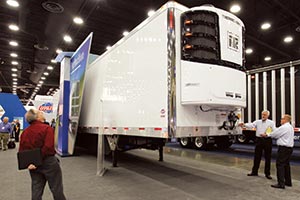Senior Reporter
Refrigerated Trailers Still a Bright Spot, Aided by New Rules, Customer Demand

This story appears in the July 18 print edition of Transport Topics.
Tougher regulations, more carriers carrying more products and new consumer preferences drove the order boom for refrigerated trailers the past two years. They remain catalysts as the up cycle for these trailers continues, experts said.
ACT Research Co. put refrigerated trailer orders at about 53,000 last year compared with 54,000 in 2014 and 34,000 in 2013.
Year-to-date, orders were about 15,000 compared with about 20,000 for the first five months of both 2014 and 2015.
“The refrigerated trailer market is hot, has been hot and will remain hot,” Don Ake, vice president of commercial vehicles at research firm FTR, told Transport Topics.
He said production should remain steady, too, due to the high backlog of 31,000 units.
“More focus on food quality and the growth of the pharmaceutical industry is driving demand,” said Craig Bennett, senior vice president of sales at Utility Trailer Manufacturing Co., considered the leader in refrigerated trailer sales.
“The refrigerated trailer market is being modernized to reflect current customer demands on the carriers by receivers and shippers,” he said. “Also, it is becoming more fragmented with growth in ethnic foods, health foods and increasing demand for fresh foods.”
Tonn Ostergard, CEO of Crete Carrier Corp., whose refrigerated subsidiary is Shaffer Trucking, agreed. Due to stricter quality controls on products shipped, “An increasing number of customers are also requiring protective services, which has contributed to an increase in demand for trailers that maintain a constant temperature,” Ostergard said.
Shaffer is ranked No. 9 on Transport Topics list of the largest for-hire carriers in the refrigerated sector with revenue of $250 million. Crete ranks No. 33 on the Transport Topics Top 100 list of the largest U.S. and Canadian for-hire carriers.
Ostergard and Bennett said air-quality regulations in California are another key factor because they target less efficient, older refrigeration units.
The California Air Resources Board requires transportation refrigeration units, or TRUs, on trailers to be no more than 7 years old.
CARB’s 2015 Enforcement Report said it completed 2,375 inspections of TRUs as part of its heavy-duty diesel inspection program, which led to 927 citations prompting $504,525 in penalties.
Replacing outdated TRUs that contribute to poor air quality is an option for meeting CARB requirements. But Frank Maly, ACT’s director of commercial vehicle transportation analysis, said a trailer at 7 years old may be better built than in the past, yet even with a replacement TRU it is still going to be old and inefficient from a thermal standpoint.
“It is going to be heavy. Moving freight on a refrigerated basis is a very humid type of situation. And the insulation can actually absorb water and when it is wet it’s going to be inefficient insulation. So there are a lot of reasons people are replacing those trailers earlier than they would have,” Maly said.
Chad Hoffman, president of the Specialized Business Division at Celadon Trucking Services, a unit of Celadon Group Inc., said the Food Safety Modernization Act is indirectly driving increased demand for temperature- controlled equipment.
“While nothing has been officially announced or even thrown on the table, there is talk that at some point in the future anything that can be consumed by a human will one day be required to be shipped on a temperature- controlled trailer,” Hoffman said.
David Gilliland, vice president of national accounts at Great Dane Trailers, said Great Dane was seeing some of the larger dry freight carriers, such as Celadon, getting in to the refrigerated business to better serve customers with many needs.
“The large truckload dry guys are typically buying a somewhat typical truckload reefer for the most part unless they partner with grocery, dairy or food-service operations, which require a more highly spec’d trailer,” Gilliland said.
Hoffman said Celadon entered the temperature-controlled market in 2013 and after a few bid cycles was able to grow its business aggressively in 2015. “More and more we are seeing shippers request temperature-controlled equipment for their freight, some of which used to be able to be hauled on a dry van trailer.”
Celadon ranks No. 32 on the TT100.




